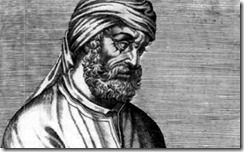 “…Now there are two conditions of prophetic announcement which I adduce, as requiring the assent of our adversaries in the future stages of the discussion. One, that future events are sometimes announced as if they were already passed. For it is consistent with Deity to regard as accomplished facts whatever It has determined on, because there is no difference of time with that Being in whom eternity itself directs a uniform condition of seasons. It is indeed more natural to the prophetic divination to represent as seen and already brought to pass, even while forseeing it, that which it foresees; in other words, that which is by all means future. As for instance, in Isaiah: “I gave my back to the smiters, and my cheeks (I exposed) to their hands. I hid not my face from shame and spitting.” For whether it was Christ even then, as we hold, or the prophet, as the Jews say, who pronounced these words concerning himself, in either case, that which as yet had not happened sounded as if it had been already accomplished. Another characteristic will be, that very many events are figuratively predicted by means of enigmas and allegories and parables, and that they must be understood in a sense different from the literal description. For we both read of “the mountains dropping down new wine,” but not as if one might expect “must” from the stones, or its decoction from the rocks; and also hear of “a land flowing with milk and honey,” but not as if you were to suppose that you would ever gather Samian cakes from the ground; nor does God, forsooth, offer His services as a water-bailiff or a farmer when He says, “I will open rivers in a dry land; I will plant in the wilderness the cedar and the box-tree.” In like manner, when, foretelling the conversion of the Gentiles, He says, “The beasts of the field shall honor me, the dragons and the owls,” He surely never meant to derive His fortunate omens from the young of birds and foxes, and from the songsters of marvel and fable. But why enlarge on such a subject? When the very apostle whom our heretics adopt, interprets the law which allows an unmuzzled mouth to the oxen that tread out the corn, not of cattle, but of ourselves; and also alleges that the rock which followed (the Israelites) and supplied them with drink was Christ; teaching the Galatians, moreover, that the two narratives of the sons of Abraham had an allegorical meaning in their course; and to the Ephesians giving an intimation that, when it was declared in the beginning that a man should leave his father and mother and become one flesh with his wife, he applied this to Christ and the church. (Adv Marc 3.5)1
“…Now there are two conditions of prophetic announcement which I adduce, as requiring the assent of our adversaries in the future stages of the discussion. One, that future events are sometimes announced as if they were already passed. For it is consistent with Deity to regard as accomplished facts whatever It has determined on, because there is no difference of time with that Being in whom eternity itself directs a uniform condition of seasons. It is indeed more natural to the prophetic divination to represent as seen and already brought to pass, even while forseeing it, that which it foresees; in other words, that which is by all means future. As for instance, in Isaiah: “I gave my back to the smiters, and my cheeks (I exposed) to their hands. I hid not my face from shame and spitting.” For whether it was Christ even then, as we hold, or the prophet, as the Jews say, who pronounced these words concerning himself, in either case, that which as yet had not happened sounded as if it had been already accomplished. Another characteristic will be, that very many events are figuratively predicted by means of enigmas and allegories and parables, and that they must be understood in a sense different from the literal description. For we both read of “the mountains dropping down new wine,” but not as if one might expect “must” from the stones, or its decoction from the rocks; and also hear of “a land flowing with milk and honey,” but not as if you were to suppose that you would ever gather Samian cakes from the ground; nor does God, forsooth, offer His services as a water-bailiff or a farmer when He says, “I will open rivers in a dry land; I will plant in the wilderness the cedar and the box-tree.” In like manner, when, foretelling the conversion of the Gentiles, He says, “The beasts of the field shall honor me, the dragons and the owls,” He surely never meant to derive His fortunate omens from the young of birds and foxes, and from the songsters of marvel and fable. But why enlarge on such a subject? When the very apostle whom our heretics adopt, interprets the law which allows an unmuzzled mouth to the oxen that tread out the corn, not of cattle, but of ourselves; and also alleges that the rock which followed (the Israelites) and supplied them with drink was Christ; teaching the Galatians, moreover, that the two narratives of the sons of Abraham had an allegorical meaning in their course; and to the Ephesians giving an intimation that, when it was declared in the beginning that a man should leave his father and mother and become one flesh with his wife, he applied this to Christ and the church. (Adv Marc 3.5)1
(And with that, he goes on to defeat Marcion.)
Tertullian, “The Five Books against Marcion,” in Latin Christianity: Its Founder, Tertullian (ed. Alexander Roberts, James Donaldson, and A. Cleveland Coxe; trans. Peter Holmes; vol. 3; The Ante-Nicene Fathers; Buffalo, NY: Christian Literature Company, 1885), 3324.
Leave a Reply
You must be logged in to post a comment.